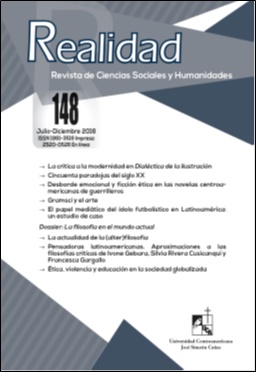Abstract
The paper aims to contribute to the breakdown of the “masculine monologue” that, according to Raúl Fornet-Betancourt, unfairly traverses the history of Latin American philosophy, ignoring the long female role in that field of knowledge. For this purpose, it proposes an approximation to the critical philosophy produced by three latinoamerican women thinker. They are: brazilian Ivone Gebara, who develops a critical epistemology of modern philosophy and theology from an ecofeminist point of view; bolivian Silvia Rivera Cusicanqui, who elaborates the theory of internal colononialism and a conception of historicity in which the present is inhabited by a multi-temporality; and ítalo-mexican Francesca Gargallo, who brings a profound fieldwork and a solid theoreticalcritical interpretation about communitarian feminisms in the indigenous women of the continent.
Realidad: Revista de Ciencias Sociales y Humanidades No. 148, 2016: 149-167

This work is licensed under a Creative Commons Attribution-NonCommercial 4.0 International License.
Copyright (c) 2016 Estela Fernández Nadal





